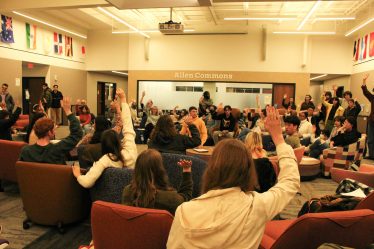Caren Holmes
Staff Writer
Campus Council announced this week that the organization is reforming aspects of its election process in order to increase student participation and streamline the election procedures.
At-Large Campus Council member, Jordan Griffith ’19 explained that the elections schedule has been moved up so as to take place two weeks prior to Spring Break so that students can vote for candidates and learn about the results more quickly.
The entire process, including petitioning, campaigning and elections will now take place within a concise three-week period. For students interested in candidacy for one of the four at-large seats or five issue seats, petitions will be distributed on Friday, Feb. 10 and collected Friday, Feb. 17.
The Council has also decided to simplify the petition itself, requiring that students sign only their name, email address and campus PO box number.
Once petitions are collected, candidates will be declared and will have the opportunity to share their platforms with the Wooster community in a variety of forums. Candidates will have the opportunity to post their information on the Council website.
In addition, candidates will participate in a structured forum where they will be encouraged to discuss their platforms and answer questions from the College community.
These forums will take place on Feb. 21 for issue seat candidates and the Feb. 27 for at-large seat candidates. Finally, elections will take place on online from March 1 through the 3.
Griffith ’19 explained that, “Council decided to make these changes to address the real problem of low participation in elections as well as the issue with lack of knowledge about the role of Council. We wanted to create a process that students can easily become involved in that will result in a Council composed of councilors elected by more of the student body.”
Campus Council Member and Gender and Sexual Diversity Representative Heather Smith ’17 expresses that she hopes the changes will not only support higher voter participation but also, “encourage more students to run for Campus Council.”
Smith highlights the importance of more candidates so that students are, “able to vote for those who they think will best represent them, instead of voting for only uncontested seats.”
Griffith said that, “While Council has undertaken several reforms this academic year to create a more responsive Council, we believe these changes will further the mission.”

